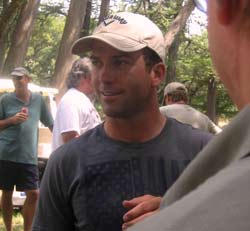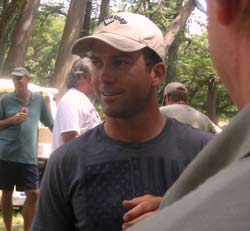On a creek bed in the rural countryside beyond the outskirts of San Antonio, shielded from the late summer Texas sun by the shade of gargantuan sycamore trees, Robert Duvall and Lucas Black are discussing fly fishing.
Or rather their characters in the forthcoming feature film, Seven Days in Utopia, are discussing fly fishing. When director Matt Russell gives the traditional “Cut!” call, the set begins to bustle. The crew and a few spectators in nearby tents exchange headphones that allow them to listen to the actors rehearse, while others rearrange the cameras so the scene can be shot again with Duvall in close up.

CT recently visited the movie set in Utopia; the film will release sometime in 2011. Between takes, Black strolls up the sloping creek bank, past the first line of tents where the actors retreat to the shade, stepping over lines of cable, to talk to members of the media about why two of Hollywood’s biggest stars (currently appearing together in Get Low) are filming a movie based on Golf’s Sacred Journey, by Christian sports psychologist David L Cook.
An avid amateur golfer, Black—who plays Luke Chisholm in the film—chats amiably about getting tips from PGA star K. J. Choi, who appears as Luke’s opponent. As for the film’s spiritual content, Black says his character’s mentor, Johnny (played by Duvall), is a religious man who regularly quotes Scripture and who, in one scene, takes Luke to a cemetery to “[bury] the lies.” Although the story and characters are fictional, the cemetery is an actual place in Utopia, and author Cook reports that he was inspired to write Golf’s Sacred Journey after a group of men at Christian retreat performed a similar symbolic ritual. In Black’s words, “[That scene is] kind of when Luke accepts Christ.” Asked if Luke’s conversion is explicitly portrayed as a religious one, Black responded, “If you don’t get that [message] from how [the scene] is, then you need to wake up.”
Duvall, meanwhile, has said he was attracted to the role of Johnny because Seven Days in Utopia was “a great tale about one man’s journey and about how you survive life’s unexpected curveballs.” (Duvall didn’t talk to the media during our set visit, but did talk to CT recently regarding Get Low.)
Cook, author of the book on which the film is based and who retains a principal screenplay credit, says the story is “about golf, but really about life.” Cook doesn’t shy away from discussing the book’s Christian elements, but will the film, in its attempt to reach beyond a faith-based audience, tone those things down? One person associated with the movie said they hope to find an audience that lands in that “sweet spot between Facing the Giants and The Blind Side.”
The film’s official website is almost devoid of Christian references. It notes that the movie is “based on the inspirational book Golf’s Sacred Journey,” and a synopsis on the film’s blog says that Luke, who is “at the end of his rope,” goes on to learn “more about golf, life and faith than he ever bargained for.” But an earlier version of the site (now taken offline) included some clearly Christian content. For example: “Through storytelling and the game of golf, David Cook is impacting the lives of people with the message of the Gospel,” and, “Through prayer and petition, with thanksgiving and sacrifice, we have been called to develop Golf’s Sacred Journey into a feature length film.” The marketing section of that now gone website stated, “Never before has there been such acceptance and open doors for Christians to place feature films with Gospel content in mainstream theaters. God is reclaiming territory in Hollywood, and we are part of this exciting time.”
Even with an apparent marketing shift, it does not appear as though the film is losing its Christian focus altogether, as evidenced by Black’s comments above. Finding a way to keep the heart of the book’s Christian message intact while still appealing to a wider audience may seem a daunting task, but Cook, for one, displays a confidence born from the experience of watching God’s Sacred Journey grow from a manuscript no publisher wanted to a hot Hollywood commodity.
Cook’s book is based on events in his own life. He was taught and mentored by a golf pro named Johnny (the late Johnny Arreaga, who coached at Baylor). As a sports psychologist, Cook has worked with college and pro athletes, including the San Antonio Spurs, Washington Wizards, University of Kansas, various Olympians and more than 100 golf pros. He’s a regular at men’s ministry events.
In Golf’s Sacred Journey, the protagonist embraces faith, freeing himself from legalism. “What I try to do in the book is create a sense of freedom and faith, not rules and regulations,” Cook once told USA Today. “There is a (Bible) verse, Galatians 5:1: ‘It is for freedom that Christ came to set us free.'”
In the foreword to the book, pro golfer Tom Lehman writes, “Although a book about golf, perhaps the strongest part of the book may be the words about forgiveness and mercy and grace.”
Copyright © 2010 Christianity Today. Click for reprint information.









